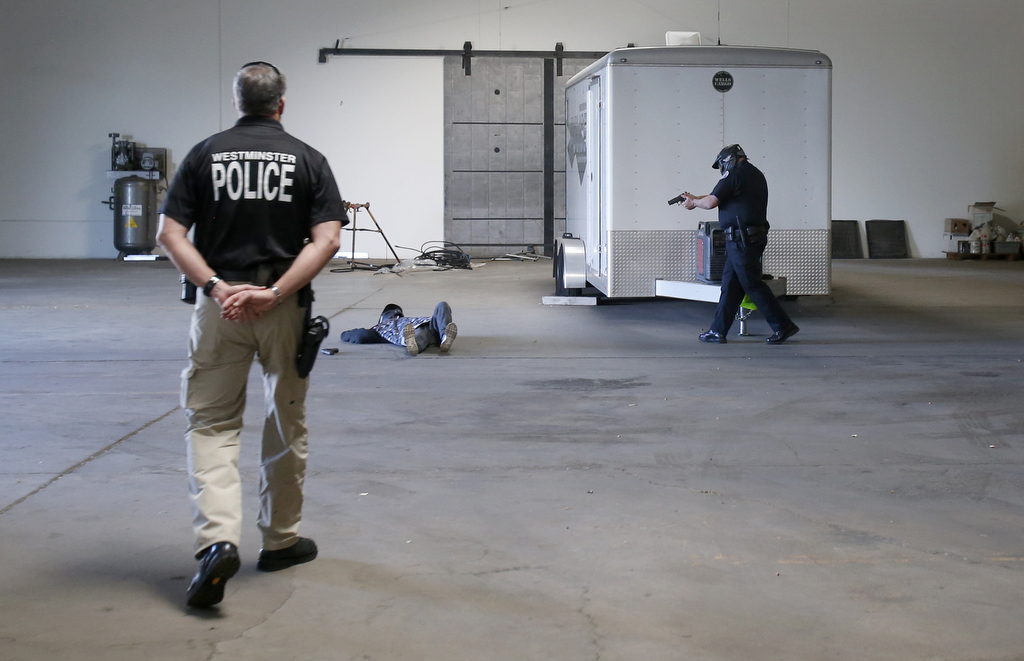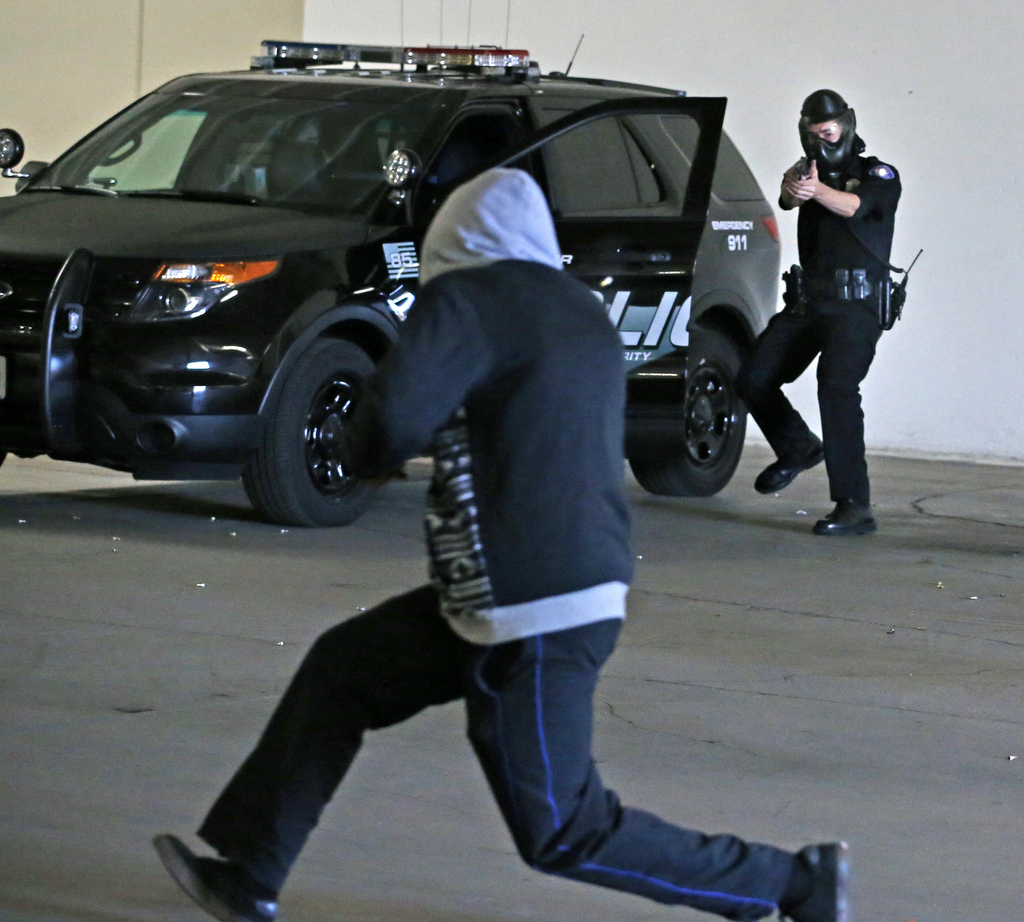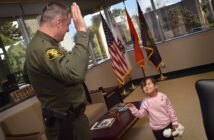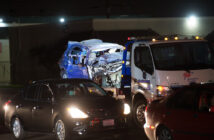My gun fell out. Crap. I don’t think that’s supposed to happen.
“Well that’s not a good sign,” Westminster PD Sgt. Kevin MacCormick told me as he slid into the passenger seat of the patrol vehicle.
I forgot to slide the thumb strap over the gun to keep it in the holster.
Let’s be clear — this wasn’t a loaded firearm, it was a simunitions gun.
A simunitions gun looks and feels like the real thing, but it’s loaded with brightly colored, soap-tipped bullets that supposedly sting like heck if you catch one on bare skin.
Lucky for me, I didn’t get to experience that.
But I experienced plenty in going through two scenarios with the Westminster Police Department as its officers completed state-required training earlier this month in several empty warehouses at a local industrial complex.
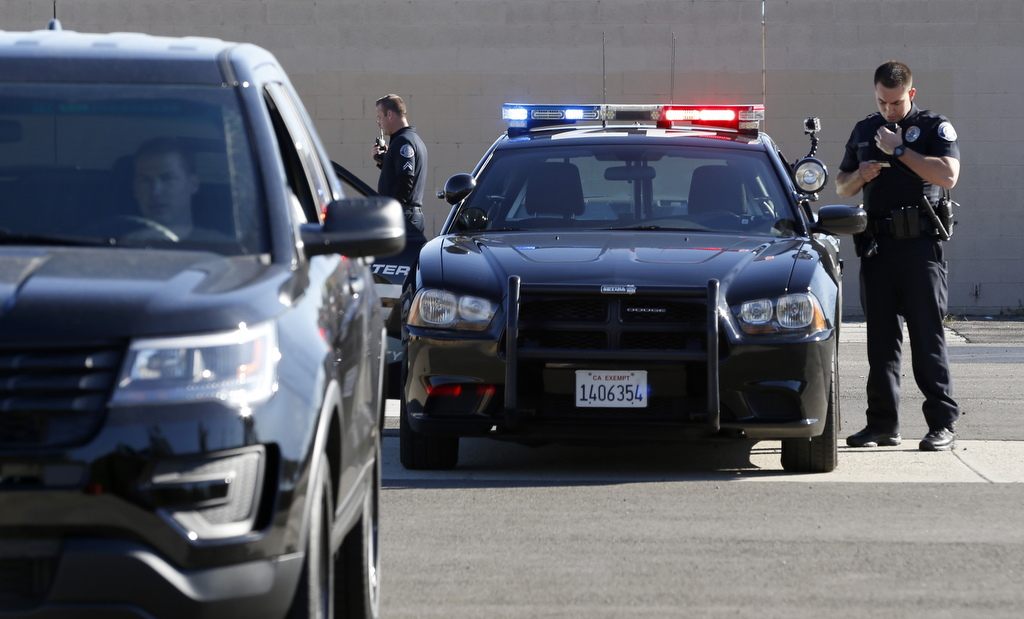
Westminster’s Nick Jezulin, right, participates in the department’s simunitions training for new recruits.
Photo by Christine Cotter/Behind the Badge OC
About every six months, officers are put through some kind of perishable skills training, MacCormick said.
Firearm training, arrest and control and driver’s training are all skills police officers have to regularly test on to ensure they are equipped to safely handle what they encounter in the field.
“This is something we do so that our officers stay fresh and don’t get complacent,” MacCormick said.
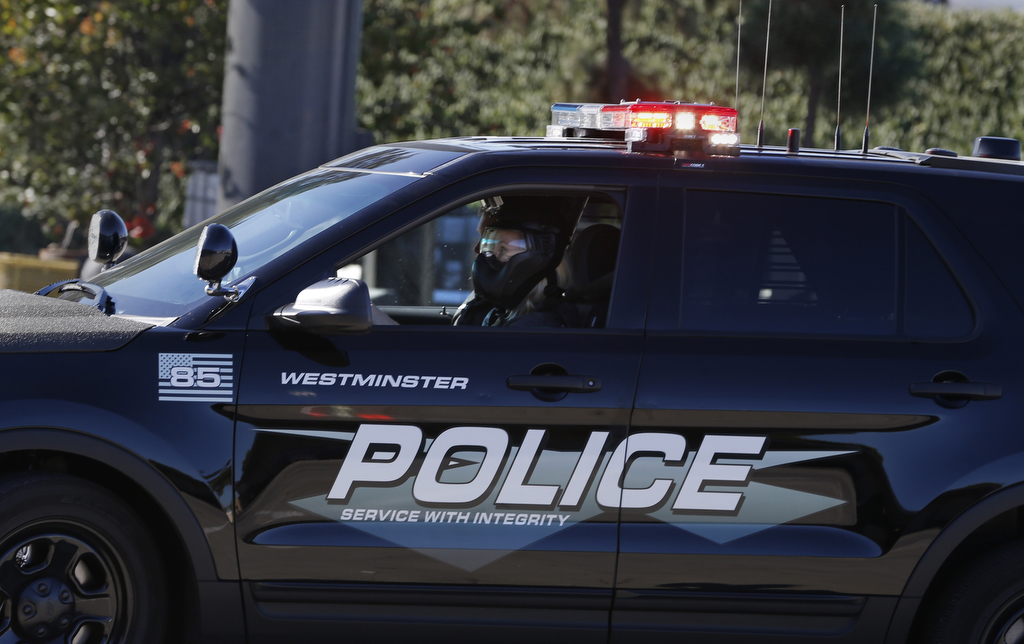
Jaimee Lynn Fletcher pursues a suspect during a simunitions training exercise at a recent Westminster Police Department’s training session.
Photo by Christine Cotter/Behind the Badge OC
MacCormick sat next to me in the patrol car and filled me in on what I was supposed to do.
“This may sound stupid, but don’t forget to put the car in park,” he said. “It happens to a lot of new officers because there is so much going on in a car stop.”
He’s kidding, right? Who forgets to put a car in park?
MacCormick tells me I’m going to perform a car stop for expired registration.
I’m expected to approach the car and go from there.
No problem.
My pulse quickened and my breathing went shallow.
Why am I nervous? This is fake.
I blame the paintball helmet they made me wear. It’s hard to breathe in this thing.
I start to exit the car and the beeping from the dashboard suddenly registers. I feel the car moving backward as I try to step down on the blacktop.
I had put the car in reverse, not park.
Now I know that’s not supposed to happen. I was even warned about this.
I quickly push the gear to park.
Nobody saw that, right? Fat chance. Everyone noticed.
I get out, walk to the car and ask the driver for license and registration.
I’m standing in the wrong position. I might as well be leaning inside the driver side door.
The passenger goes to open the glove box.
I don’t like it.
“Put your hands on the dashboard,” I yell.
They do.
“Give me your registration,” I repeat.
“But it’s in the glove box,” the man says.
Oh. Now what?
“Um, OK,” I said. “Get it. Slowly.”
He lifts the registration and I see it — a gun.
“Get out of the car,” I tell them.
Nailed it.
I command them out of the car, waving their vehicle registration papers as some sort of directional aide to coax the suspects to the back of the car.
They are doing exactly as I say.
I’m good at this.
I ask them to place their hands on the back of the vehicle and they do.
Maybe I should have been a cop.
I don’t know what to do next, so I just stand there.
MacCormick calls an end to the scenario then explains what I did wrong — which was pretty much everything.
“If you see a gun, usually you’d draw your weapon, order them to stay in the car, retreat and call for backup,” he tells me. “You don’t ever want to ask them to get out of the car if you’re alone. How can you control both of them?”
All I was thinking about was how to get the suspects away from the threat in the glove box. The fact that it was two on one didn’t even occur to me.
Final grade: fail.
OK, maybe I should stick to writing about cops.
Scenario two was up.
This time I was sitting in a patrol vehicle, pretending to write a report.
“As officers, we spend about 90 percent of our time writing reports,” MacCormick said. “When we’re sitting in our car, it’s very common for citizens to come up and want to contact us.”
I see two people emerge from behind a trailer. They’re yelling at me that they have a question.
The duo splits and starts walking in opposite directions from each other. They are closing in on me.
Nothing struck me as odd until one of the suspects fired the first round.
I didn’t even see the gun before I heard it going off.
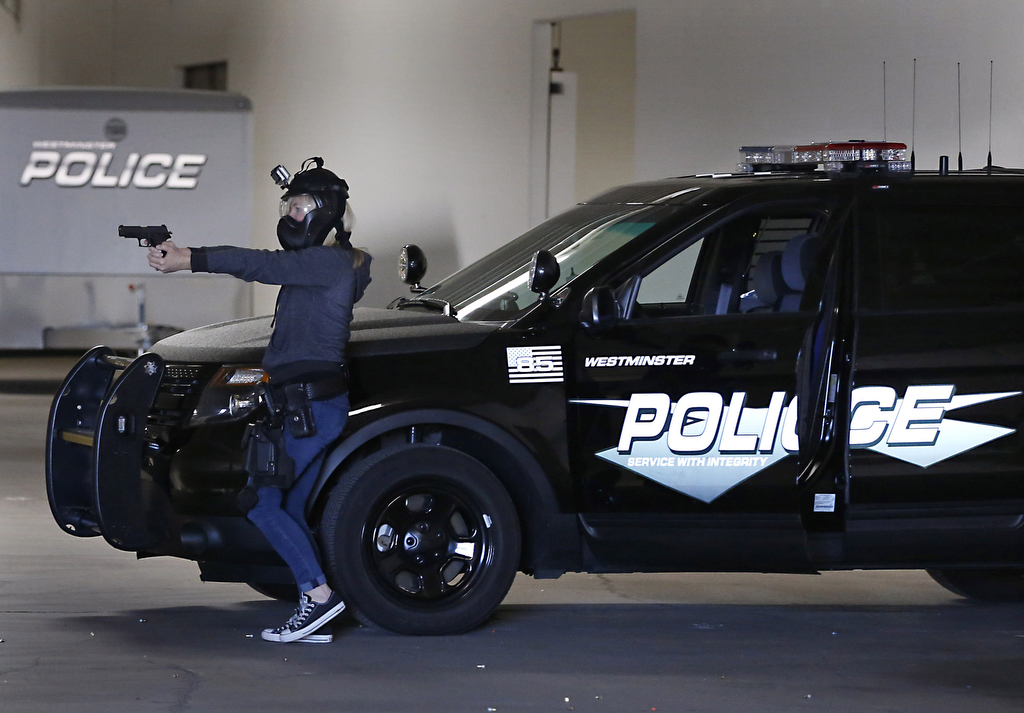
Jaimee Lynn Fletcher is ready to fire on a suspect during the Westminster Police Department’s simunitions training session.
Photo by Christine Cotter/Behind the Badge OC
I pull my weapon and shoot out the window in the general direction of the shooter.
Aim? What’s aim?
I get out of the car — or at least try to.
I’m stuck. Stupid utility belt. Is it called a utility belt or is that strictly a Batman thing?
I keep firing but not one shot lands on the suspect.
The police explorer playing the shooter finally falls to the ground because — let’s be honest — we’d be there all day if anyone expected me to land a soap-tipped bullet on a moving target.
“Now I’d call for backup,” I tell MacCormick.
He ends the training.
With this scenario, MacCormick said I did better.
I got a thumbs up for shooting from my vehicle and not trying to exit while the suspect was spraying bullets in my direction.
My reaction time wasn’t great, but it wasn’t terrible, MacCormick told me.
Categorize that a win in my book.
If this happened in real life, MacCormick wasn’t sure I’d make it out alive.
I better work on my aim.
But for an untrained civilian, he told me I wasn’t horrible.
Maybe he was being nice.
“Am I the worst you’ve seen go through this?” I asked.
“No, you’re not the worst I’ve ever seen,” he replied. “Well, on this one. On the car stop? Oh yeah, you’re the worst.”
Going through this training was fun.
I got to — if only briefly — live out some long-suppressed teenage fantasy of going after the bad guys.
(To be more specific, my teenage fantasy was to be the female version of Robert Redford in “Spy Game” which, I’d argue, is law enforcement-esque.)
But participating in this training was also eye-opening.
I watched these officers go through the scenarios with ease — each one handling the situations a little differently from the person before.
In addition to the two I was put through, Westminster PD tested their officers on how to handle a transient with a knife hidden in his duffel bag and how to run a building search.
Not every situation ended with weapons drawn or shots fired.
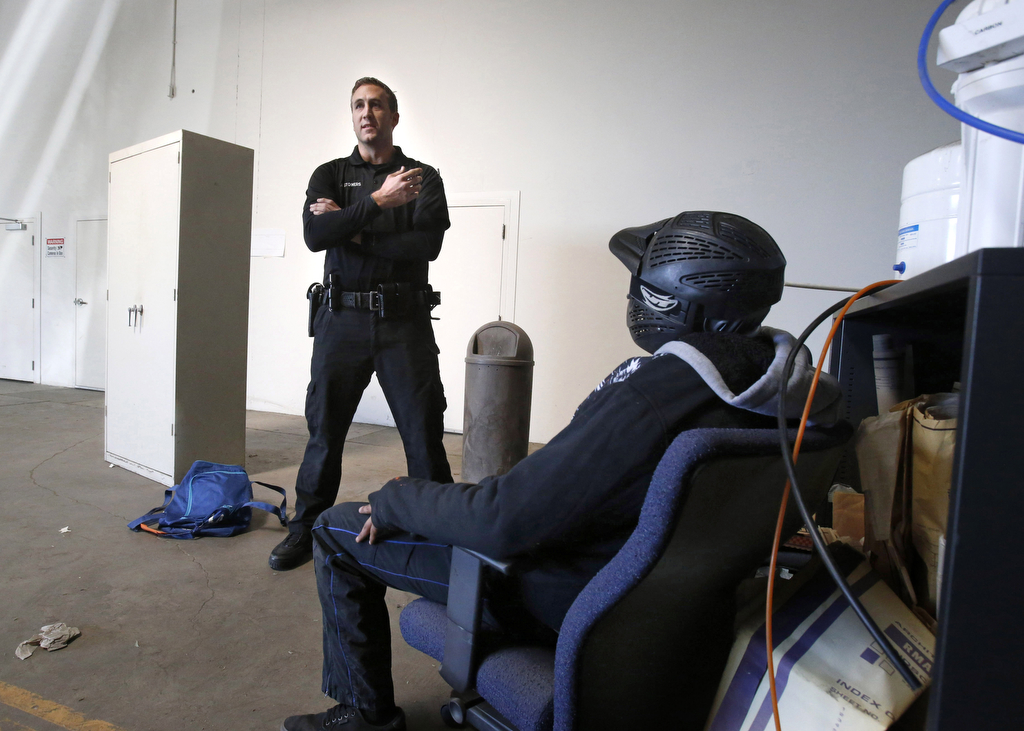
Westminster Det. Andy Stowers makes a suspicious person stop during a simunitions training session.
Photo by Christine Cotter/Behind the Badge OC
In many cases, officers used their training to talk a threat down and peacefully resolve potentially life-threatening scenarios.
Officers rely on their training and experiences to assess an impossible number of what ifs every day on the job and are expected to expertly react every time.
Things that seem innocuous — a basic traffic stop or writing a report in a vehicle — can turn into some of the most dangerous things they encounter.
Often time, decisions must be made in seconds and with a precision that seems incomprehensible to this civilian who blew it when put to the test.
That’s why this type of training is so important — to stay safe and make informed decisions, said Officer Jason Stouffer.
“It keeps us on our toes,” he said. “We know that this is training but we always have in the back of our heads that if this really happened, we could end up paying with our life.”
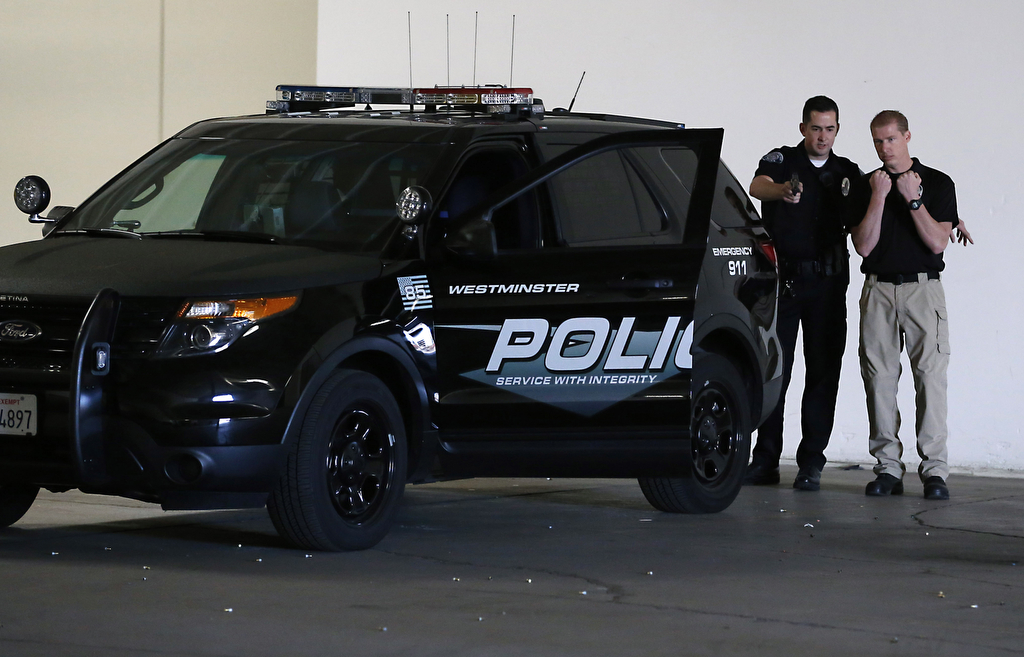
Cpl. Scott Gump, right, instructs Officer Brian Cramer during a recent training exercise for new recruits.
Photo by Christine Cotter/Behind the Badge OC
 Behind the Badge
Behind the Badge
